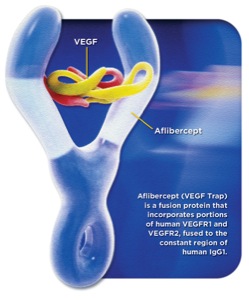
Aflibercept (Zaltrap, Regeneron/Sanofi) has been approved by the US Food and Drug Administration (FDA) for use in the treatment of metastatic colorectal cancer.
The indication is for use in combination with the conventional FOLFIRI regimen (leucovorin, irinotecan, 5-fluorouracil) for the second-line treatment of patients who have progressed on an oxaliplatin-containing regimen. The same indication is awaiting approval in Europe and elsewhere in the world.
The approval is based on the phase 3 VELOUR (Aflibercept Versus Placebo in Metastatic Colorectal Cancer After Failure of an Oxaliplatin-Based Regimen) trial. In the 1226 VELOUR patients, the addition of aflibercept to the FOLFIRI regimen significantly improved both overall and progression-free survival.
In a statement, Ricahrd Pazdur, MD, director of the Office of Hematology and Oncology Products at the FDA's Center for Drug Evaluation and Research, said the approval "demonstrates the benefit of adding a biological agent [in this case aflibercept] to a commonly used chemotherapy drug regimen."
Aflibercept is an angiogenesis inhibitor, a novel fusion protein that acts like a sponge to mop up circulating vascular endothelial growth factor (VEGF). It has been described in the scientific literature as a "VEGF trap." It inhibits VEGF types A and B and placental growth factor, so has a broader mechanism of action than currently available antiangiogenic agents such as bevacizumab (Avastin).
Aflibercept has been developed for ocular use as Eylea (by Regeneron in conjunction with Bayer). That ophthalmic solution was approved for the treatment of neovascular (wet) age-related macular degeneration by the FDA late last year.
In addition, aflibercept has been investigated for prostate cancer, but Regeneron announced recently that a large phase 3 study, known as VENICE, showed no improvement in overall survival. In VENICE, aflibercept was added to docetaxel and prednisolone as a first-line treatment for men with metastatic androgen-independent prostate cancer.
Improved Survival in Colorectal Cancer
The results from the VELOUR trial were first presented at the 2011 World Gastrointestinal Cancers Congress, which was organized by the European Society of Medical Oncology (ESMO) and held in Barcelona, Spain. After that meeting, in his Kerr on Oncology videoblog, David Kerr, MD, professor of cancer medicine at Oxford University in the United Kingdom and ESMO president, described the efficacy results as "fascinating."
The addition of aflibercept doubled the response rate, from 10% to 20%, he noted. Progression-free survival was improved by about 2 to 3 months, but most important, overall survival (which was the primary end point of the study) was increased from about 12.0 months to 13.5 months. "I think this is an interesting step forward" in the management of colorectal cancer," Dr. Kerr noted. Aflibercept is "a new tool that we have in second-line [therapy]," he added.
A press release issued by the FDA adds another detail from the clinical trial: median progression-free survival improved from 4.7 months with FOLFIRI alone to 6.9 months with aflibercept plus FOLFIRI.
The FDA notes that the product carries a boxed warning about the risk for severe and sometimes fatal bleeding, including gastrointestinal bleeding, and the risk for "the development of holes in the gastrointestinal tract." In addition, the drug can impair wound healing.
The most common adverse effects observed in patients receiving aflibercept plus FOLFIRI were neutropenia, diarrhea, mouth ulcers, fatigue, hypertension, proteinuria, weight loss, decreased appetite, abdominal pain, and headache.
Where Will it Fit?
Another angiogenesis inhibitor, bevacizumab, is already approved as first-line therapy, and recent clinical trial data suggest that patients might benefit from continuing bevacizumab therapy even after disease progression. Dr. Kerr explained that a big clinical question will be whether to continue with bevacizumab in such patients, or whether switch to aflibercept, which has a slightly different approach to angiogenesis inhibition.
"At some stage, we will need head-to-head trials to sort out this dilemma," he noted.
Clinicians are already forming opinions on the basis of the data that are out there, as seen in the discussion recorded by Medscape Medical News after the American Society of Clinical Oncology annual meeting held earlier this year. John Marshall, MD, professor of medicine at Georgetown University Hospital and director of clinical research at the Lombardi Comprehensive Cancer Center in Washington, DC, predicted that aflibercept will find its own niche, but noted that it has a reputation of having a slightly worse adverse-effect profile.
"If I had a very stable...metastatic colon [cancer] patient who has been 12 months on frontline therapy with subtle progression, I would probably keep that patient on bevacizumab," he said.
However, in a patient who is not having a good response and who has rapidly progressing cancer, "I might consider trying aflibercept as a different approach. Maybe I [could] get a...bit more mileage from that approach," he added.
He noted that there is a third biologic option for patients with colorectal KRAS wild-type tumors — epidermal growth factor receptor inhibitors such as cetuximab and panitumumab.





 留言列表
留言列表
 線上藥物查詢
線上藥物查詢 